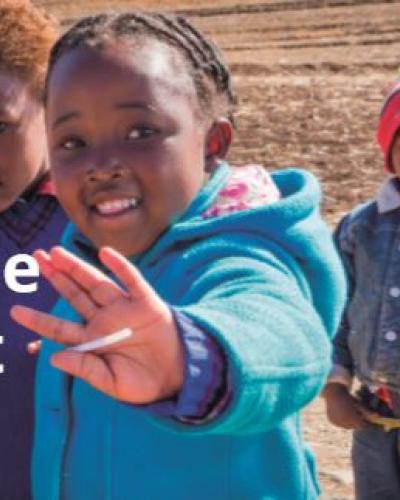UNDAF Fact sheet: Pillar 2- Sustainable Human Capital Development

WEAK HEALTH SECTOR
Lesotho is facing formidable public health challenges, including low coverage of essential public health services and weak public health institutions. Most health Millennium Development Goals (MDGs) were not achieved. The high rates of communicable and non-communicable diseases, including tuberculosis and the HIV pandemic, place significant pressure on health infrastructure and resources. Maternal, infant and child survival is precarious and compounded by extremely high rates of childhood stunting and poor access to quality health care services during pregnancy, childbirth and after delivery, especially in rural areas. Delivery in health facilities stood at only 77 per cent in 2014.
POOR ACCESS TO QUALITY EDUCATION
Access to and quality of education also remain a challenge. Although primary education is free and compulsory, and the majority of girls and boys (over 89 per cent) enrol in school, many drop out. Only 7 in 10 students who start the first grade of primary school complete the last grade, with boys less likely to do so than girls. Children in rural areas are also less likely to make it to the last grade of primary school: 59 per cent compared to 86 per cent for urban children.
Secondary school completion fares worse, with only just over 4 in 10 completing junior secondary and 1 in 3 senior secondary. Gross enrolment in pre-primary education is 42 per cent, and 1 in 4 disabled children aged 5–10 does not attend school. Access to non-formal education for those who have missed out on formal education remains limited, particularly in rural areas.
HIGH INEQUALITY AND CHILD POVERTY
Lesotho is one of the 10 countries globally with the greatest inequalities, with a Gini coefficient of 0.549 in 2016. Poverty remains a persistent problem. More than 6 in 10 children live in multidimensional poverty where they are deprived of three or more basic social services (education, health, information, nutrition, sanitation, shelter, water and others). The high poverty levels are one of the key drivers of child labour in the country, which is growing rapidly across different sectors. The lack of disaggregated data, in particular by age and gender, creates additional challenges in identifying those most in need.
Achieving sustainable human development in Lesotho.
CHALLENGES IN ACCESS TO SERVICES FOR MIGRANTS
There is a challenge for migrants to access services in the public health centres, mainly due to the language barrier and limited access to information, as they have not been fully integrated into the host community. The lack of data disaggregated by migratory status makes it difficult to develop an evidence-based policy.
GENDER-BASED VIOLENCE IS WIDESPREAD
Violence against women is pervasive. Underpinned by unequal gender norms, it violates women’s human, sexual and reproductive rights and prevents them from fully participating in public decision-making forums. Lesotho is also a source, transit and destination country for forced labour and sex trafficking. A policy framework is needed to address trafficking in persons and smuggling of migrants through strengthening the criminal justice system and victim support.
ANTI-CORRUPTION MEASURES REQUIRED
Similar efforts are required to strengthen government capacities to implement measures against money laundering and in detecting, seizing and confiscating illicit proceeds, as required by United Nations instruments and other globally accepted standards.















